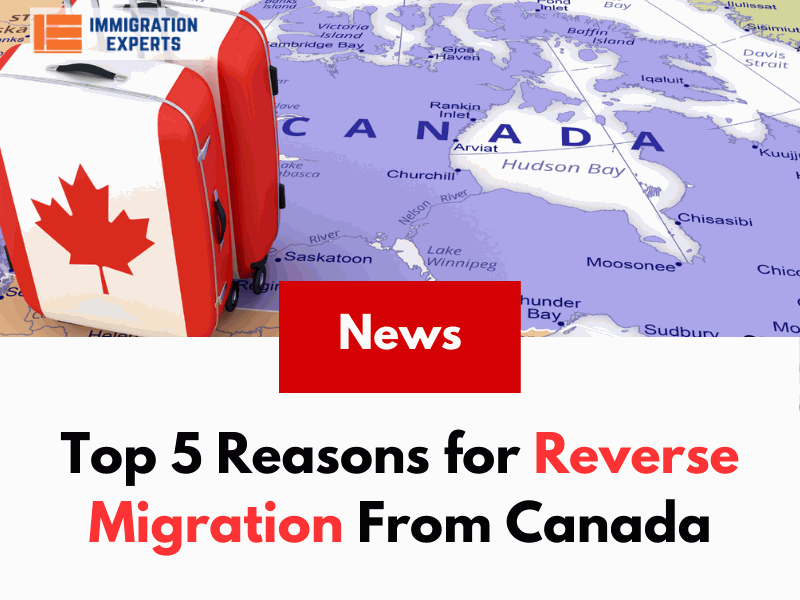051 8439995, 042 35911332

Reverse migration from Canada involves individuals leaving the country and returning to their home country or relocating to a different place, and this phenomenon can arise due to various motives.
For quite some time, immigrants seeking a superior quality of life, economic opportunities, and social stability have regarded Canada as an appealing choice.
In recent years, an intriguing trend referred to as reverse migration from Canada has emerged and gained momentum. This unexpected phenomenon has been influenced by several significant factors, which we will now outline.
Things You Will Find In This Page
Economic Shifts

Canada’s economic landscape is not uniform across all regions. While some areas experience sustained growth and ample job opportunities, others face economic downturns and limited prospects. For example, resource-dependent provinces may witness a decline in their primary industries, leading to job losses and a less favorable economic outlook. Skilled professionals who find themselves affected by these shifts may opt to explore other countries or regions where they can leverage their expertise and find better career prospects.
Moreover, economic factors such as rising living costs, housing affordability challenges in major cities, and increasing competition in the job market can also push individuals to consider reverse migration. In search of better financial stability and a higher standard of living, some individuals may decide to return to their home countries or explore new locations with promising economic opportunities.
Changing Immigration Policies
Canada has implemented various changes to its immigration policies over the years, which have had an impact on individuals’ decisions regarding their stay in the country. Tightening regulations, increased requirements for permanent residency or citizenship, and a more selective approach to immigration have made it more difficult for certain individuals to secure long-term status in Canada.
As a result, some immigrants may choose to return to their home countries or explore immigration options in countries with more flexible or favorable policies. They may seek alternative destinations that offer a more streamlined and accessible immigration process, allowing them to establish a stable and secure future for themselves and their families.
Family and Social Factors
The desire to be close to family members and support systems can be a powerful driver for reverse migration. Immigrants who have spent years in Canada may feel a strong longing to reconnect with their roots, traditions, and cultural heritage. They may also wish to provide care and assistance to aging parents or support their extended families during significant life events.

The need for familial and social connections, coupled with advancements in technology that facilitate remote work and communication, has made it easier for individuals to consider reverse migration without sacrificing professional opportunities. These factors contribute to the decision-making process, as people seek a balance between personal and professional fulfillment in their chosen location.
Quality of Life Considerations
While Canada is often regarded as a country offering a high quality of life, individual preferences and priorities can differ significantly. Factors such as climate, cultural compatibility, healthcare accessibility, and cost of living can play a crucial role in an individual’s decision to relocate or return to their home country.
For example, some individuals may find it challenging to adapt to Canada’s cold climate or prefer a different cultural environment that aligns more closely with their values and beliefs. Others may prioritize affordable healthcare options or seek a location with a lower cost of living, enabling them to enjoy a higher standard of living or achieve greater financial stability.
Skilled Immigrants Facing Challenges
Despite the low unemployment rate in Canada, many recently arrived immigrants frequently encounter significant challenges in finding jobs in their respective industries or making use of their former work experience.

Even with the government of Canada’s official job bank website, it proves to be exceedingly difficult for new immigrants to find relevant job opportunities. The system designed to connect job seekers with employers does not always yield fruitful results for these individuals.
Even with the government of Canada’s official job bank website, it proves to be exceedingly difficult for new immigrants to find relevant job opportunities. The system designed to connect job seekers with employers does not always yield fruitful results for these individuals.
Although Canada has established commendable pathways for skilled immigrants to enter the country, many of these individuals, selected based on their expertise and qualifications, encounter difficulties in finding suitable employment upon arrival.
For instance, newly immigrated engineers and doctors often find themselves compelled to work in alternative fields, such as driving cabs or serving in restaurants, to make ends meet while also grappling with the additional challenge of meeting regulatory authority requirements for their professions.
Given these circumstances, some highly qualified professionals may ultimately decide that it is more practical for them to return to their home countries and rebuild their careers there. This decision allows them to resume their practices under familiar regulations and potentially find greater professional fulfillment.
The Final Thoughts
This article explores the factors that contribute to the decisions of some individuals to leave Canada, offering insights into their motivations. While Canada remains an attractive destination for immigrants worldwide, it is important to understand why certain individuals choose to depart from the country.
As the phenomenon of reverse migration develops, it becomes essential for the government, businesses, and as well as communities to understand the root causes and take appropriate measures to address them.
They can retain Canada’s appeal as a friendly and hopeful destination for immigrants by actively dealing with these issues, while also acknowledging and supporting individuals who seek out new possibilities elsewhere.
